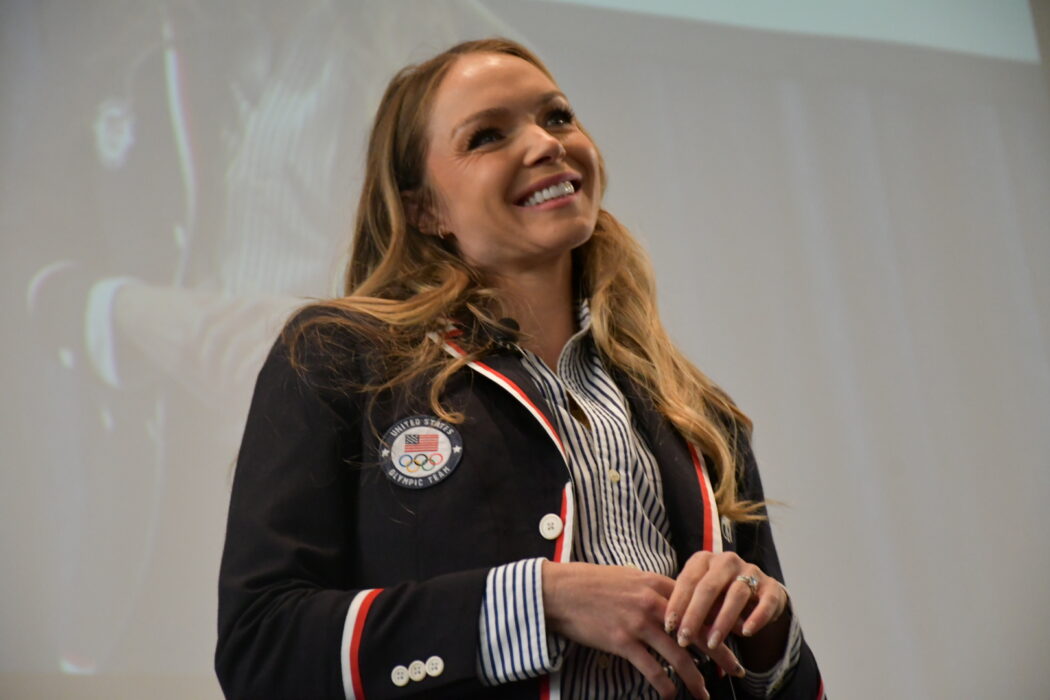Chari Hawkins: “I Can Do It With a Broken Heart”
On Thursday, Oct. 10, 2024, Utah State alum and five-time Team USA member and Olympic athlete Chari Hawkins returned to her college home to share her story for World Mental Health Day. Her keynote presentation, titled “The Heart of a Champion,” went far beyond athletics — Hawkins gave the audience more than just sports wisdom. She offered something deeply personal: lessons on resilience, the importance of showing up and the value of mental health as a whole.
One of the most powerful moments came when Hawkins reflected on her parents’ unwavering support throughout her career. She emphasized they didn’t only celebrate her victories — they were there during her toughest losses too.
“They don’t just show up when I win. They show up when I lose,” Hawkins said, crediting her parents for teaching her the importance of effort, not outcome.
She encouraged the audience, especially parents, to follow this example: “Always let [your kids] know what they did well, in the way that they showed up and not just how they placed in their sport.” Whether a child finishes first or last, what matters most is the heart they put into their effort.
For Hawkins, this mindset laid the foundation for a healthier relationship with success and failure — an approach that carries with her today.
“What they unconsciously learn is that it is how they show up because you can never control how others are going to do it. You can only control what you can do,” Hawkins said.
As someone who works with sports psychologists, Hawkins likened therapy to coaching. She stressed the importance of having someone guide you, not just for sports but for life. Just like how she recommended having a coach to help you make it to and through the Olympics, she recommended having a therapist to help you make it through life.
She shared that once her athletic career ends, she plans to transition from working with a sports psychologist to a general therapist.
“I want my emotions. I want them to be protected, and I want to know how to handle them the best way I can,” she said.
Hawkins also offered a profound insight: “If you can turn your anxiety into excitement and make that shift, they feel really similar … [but] one feels a little bit like closed, and one feels really, really, like, excited.”
She urged people not to see therapy as a sign of weakness but rather as a way to unlock your full potential.
“I understand that I don’t know everything, but I kind of want to, so I’m going to get somebody who can guide me a little bit better,” Hawkins said.
At the heart of Hawkins’s talk was the message that mental health is non-negotiable, whether you’re an athlete or not. She was candid about moments of struggle, recalling how she cried for hours during the Paris Olympics day two.
“I did all my crying. I got it all out. Everything is fine. I got a good night’s rest. I’m ready … I put one foot on that grass, and I started sobbing,” she said.
However, she also shared small moments, like hearing “I Can Do It With a Broken Heart” by Taylor Swift, which helped her turn things around.
“That song is actually one of the reasons I was able to get through day two,” Hawkins said with a smile, adding that she now gets emotional every time she hears it again.
Her message was clear: mental health isn’t just something to be addressed when things go wrong, it’s something to nurture every day. Hawkins reminded the audience that even Olympic-level athletes need support.
When asked about her favorite part of competing at the Olympics, Hawkins reflected on a simple joy: the Olympic rings.
“I made sure to absorb every second that I saw something with the Olympic rings on them because I remember all the times that I didn’t make the team,” she said.
Even now, Hawkins admits that the more she trains, the more she feels she isn’t good enough — a feeling many athletes know well. But instead of being discouraged, she reframes it: “You’re not good when you’re getting better really fast … so now that you’re good, it’s harder to get better.”
Hawkins didn’t sugarcoat the challenges of being a professional athlete. Early in her career, she faced financial struggles, working as a nanny to make ends meet.
“Track paid me negative $4000 a month,” she said.
Yet, she found ways to merge her passions with her circumstances, teaching the kids she babysat how to foam roll and practice yoga.
Today, she’s excited about the future and the possibilities beyond sports. Hawkins revealed that she is currently working on a children’s book.
As for the 2028 LA Olympics, she left the door open, saying, “I never say never to LA 2028,” and “I’ll be in LA 2028, but I’m not sure in what fashion yet, whether it’s going to be broadcasting, or whether it’s going to be with Team USA across my chest.”
At the end of her talk, Hawkins emphasized how having the heart of a champion is choosing to show up for yourself everyday. She left a final thought saying, “All of us have the opportunity to have the heart of a champion.”
Her message was one of hope and resilience — not just for athletes but for everyone. She encouraged the audience to take her words to heart and to apply the lessons of perseverance and self-care to their families, friendships and communities.
“Your mental health matters. Please take care of it,” Hawkins said.
Chari Hawkins may be an Olympic athlete, but the wisdom she shared goes far beyond the track. Her story is a reminder that life’s greatest victories come not from where we place but how we show up and the effort we put in.
And that’s what makes a true champion.

